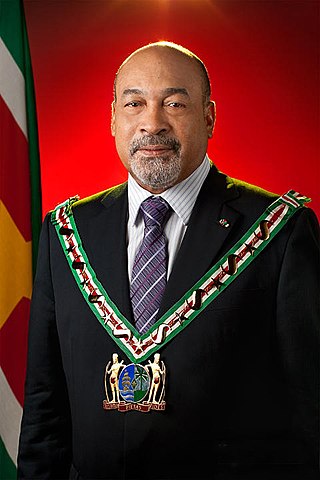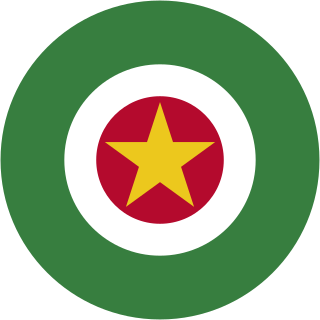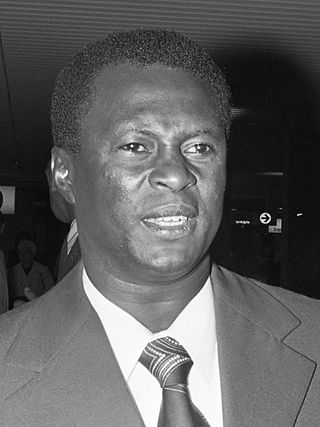Related Research Articles
Capital punishment, also known as the death penalty and formerly called judicial homicide, is the state-sanctioned practice of killing a person as a punishment for a crime, usually following an authorised, rule-governed process to conclude that the person is responsible for violating norms that warrant said punishment. The sentence ordering that an offender be punished in such a manner is known as a death sentence, and the act of carrying out the sentence is known as an execution. A prisoner who has been sentenced to death and awaits execution is condemned and is commonly referred to as being "on death row". Etymologically, the term capital refers to execution by beheading, but executions are carried out by many methods, including hanging, shooting, lethal injection, stoning, electrocution, and gassing.
After the creation of the Statute of the Kingdom of the Netherlands, the Royal Netherlands Army was entrusted with the defence of Suriname, while the defence of the Netherlands Antilles was the responsibility of the Royal Netherlands Navy. The army set up a separate Netherlands Armed Forces in Suriname. Upon independence in 1975, this force was turned into the Surinamese Armed Forces. On February 25, 1980, a group of 15 non-commissioned officers and one junior officer, under the leadership of sergeant major Dési Bouterse, staged a coup d'état and overthrew the Government. Subsequently, the SKM was rebranded as the National Army.

Capital punishment, also called the death penalty, is the state-sanctioned killing of a person as a punishment for a crime. It has historically been used in almost every part of the world. Since the mid-19th century many countries have abolished or discontinued the practice. In 2022, the 5 countries that executed the most people were, in descending order, China, Iran, Saudi Arabia, Egypt, and the United States.

Desiré Delano Bouterse is a Surinamese military officer, politician, convicted murderer and drug trafficker who served as President of Suriname from 2010 to 2020. From 1980 to 1987, he was Suriname's de facto leader after conducting a military coup and establishing a period of military rule. In 1987, Bouterse founded the National Democratic Party (NDP). On 25 May 2010, Bouterse's political alliance, the Megacombinatie, which included the NDP, won the parliamentary elections, and on 19 July 2010, Bouterse was elected as President of Suriname with 36 of 50 parliament votes. He was inaugurated on 12 August 2010.
Wilfred Hawker was a sergeant-major in the Surinamese military who was involved in two unsuccessful coups d'état in the early 1980s. Hawker was executed by the ruling military government for his role in the plots. He was the last person to be legally executed by Suriname.

The Surinamese Interior War was a civil war waged in the Sipaliwini District of Suriname between 1986 and 1992. It was fought by the Tucayana Amazonas led by Thomas Sabajo and the Jungle Commando led by Ronnie Brunswijk, whose members originated from the Maroon ethnic group, against the National Army led by then-army chief and de facto head of state Dési Bouterse.
Capital punishment in New Jersey is currently abolished, after Governor of New Jersey Jon Corzine signed a law repealing it in 2007. Before this, capital punishment was used and at least 361 people have been executed.

The 1980 Surinamese coup d'état, usually referred to as the Sergeants' Coup, was a military coup in Suriname which occurred on 25 February 1980, when a group of 16 sergeants of the Surinamese Armed Forces (SKM) led by Dési Bouterse overthrew the government of Prime Minister Henck Arron with a violent coup d'état. This marked the beginning of the military dictatorship that dominated the country from 1980 until 1991. The dictatorship featured the presence of an evening curfew, the lack of freedom of press, a ban on political parties, a restriction on the freedom of assembly, a high level of government corruption, and the summary executions of political opponents.

Capital punishment in Lithuania was ruled unconstitutional and abolished for all crimes on 9 December 1998. Lithuania is a member of the Council of Europe and has signed and ratified Protocol 13 of the European Convention on Human Rights on complete abolition of death penalty. From March 1990 to December 1998, Lithuania executed seven people, all men. The last execution in the country occurred in July 1995, when Lithuanian mafia boss Boris Dekanidze was executed.

The Suriname Air Force is the air component of the Military of Suriname. All aircraft of the Suriname Air Force undertake border patrols, utility transport, and search and rescue missions from Zorg en Hoop Airport, the Air Force's main base. Aircraft are occasionally transferred to other air bases in the nation, which include Johan Adolf Pengel International Airport, Major Fernandes Airfield, Albina Airstrip, and Moengo Airstrip. The head of the Suriname Air Force is the Commander of the Air Force, currently Lieutenant Colonel Marven van Huisduinen, who took over the role in March 2019 from former Commander Robert Kartodikromo. The Air Force is further split into several wings, including the Helicopter Wing, the current Commander of which being Captain John-Marc Arron.
Paul Bhagwandas was a Suriname battalion commander. He was one of the sergeants who participated in a military coup in Suriname on 25 February 1980. Bhagwandas was the third man in the military dictatorship after Dési Bouterse and Roy Horb and was known as "the executioner of Fort Zeelandia".
Roy Dennis Horb was a Surinamese military officer. He was one of the sergeants who committed a military coup in Suriname on 25 February 1980, and the right hand man of army leader Dési Bouterse.

Surendre Sradhanand "Soerinder" Rambocus was a Surinamese serviceman. For a short period, he was the highest-ranking officer of the Suriname National Army. He was involved in the unsuccessful coup d'état of March 1982 against the then dictator of Suriname, Dési Bouterse, and was executed on 8 December 1982 as one of the December murders.

Edmund Alexander "Eddy" Hoost was a Surinamese politician and lawyer. He was Minister of Justice and Police between 1973 and 1977. After the independence of Suriname, he became the first Minister of Defence and served until 1977. He was one of the victims of the December murders.
Baal Indradj Oemrawsingh was a Surinamese professor of biochemistry at the University of Suriname, and member of the National Assembly of Suriname between 1977 and 1980. He was considered the political leader behind the Rambocus Coup of March 1982. He was one of the victims killed by the military regime of Dési Bouterse.
Capital punishment is no longer a legal punishment in Rwanda. The death penalty was abolished in the country in 2007.
Capital punishment in the Democratic Republic of the Congo is legal; however, the nation has not carried out any executions since 2003, meaning that the country experienced a de facto moratorium on the death penalty from their latest executions in 2003 until March 2024.
Capital punishment is a legal penalty in Cameroon. However, the country not carried out any official executions since 1997, making it de facto abolitionist, since it also has a moratorium.
Capital punishment in Burkina Faso has been abolished. In late May 2018, the National Assembly of Burkina Faso adopted a new penal code that omitted the death penalty as a sentencing option, thereby abolishing the death penalty for all crimes.
References
- ↑ "De nacht van Killinger" [Killinger's night]. Trouw (in Dutch). 26 May 1990. Retrieved 17 January 2022.
- ↑ "De Doodstraf is Suriname" [The death penalty is Suriname]. Amigoe di Curacao (in Dutch). 23 December 1922. Retrieved 17 January 2022.
- ↑ "Rohanna" [Rihanna]. De Surinamer (in Dutch). 14 January 1923. Retrieved 17 January 2022.
- ↑ "Moord te Nickerie" [Murder in Nickerie]. De Noord-Ooster (in Dutch). 29 August 1925. Retrieved 17 January 2022.
- ↑ "Niet beinvloeden" [Do not influence]. Suriname (in Dutch). 1 November 1927. Retrieved 17 January 2022.
- ↑ "Het einde van Apatoe" [The end of Apatoe]. De West (in Dutch). 22 November 1927. Retrieved 17 January 2022.
- ↑ "Around the World; Rebel Leader's Execution Announced by Suriname". The New York Times. 14 March 1982. ISSN 0362-4331 . Retrieved 17 January 2022.
- ↑ "Hawker zonder vorm van proces terechtgesteld" [Hawker executed without trial] (in Dutch). 15 March 1982. Retrieved 17 January 2022.
- ↑ "SLACHTOFFERS" [VICTIMS]. Decembermoorden (in Dutch). Retrieved 17 January 2022.
- ↑ "Suriname abolishes death penalty". Jamaica Gleaner. 6 March 2015. Retrieved 17 January 2022.